| Category | Dissertation | Subject | Entrepreneurship |
|---|---|---|---|
| University | University of Greenwich | Module Title | BUSI1326 Fundamentals of Entrepreneurship |
| Word Count | 3000 Words |
|---|---|
| Assessment Title | Module Handbook |
| Academic Year | 2025-26 |
1. Welcome message from your Module Leader
2. Key contacts (academic queries)
3. Enquiry-Based Learning and Research-Led Teaching 4. Module details and learning outcomes
5. Employability
6. Key Dates
7. Schedule of teaching and learning activities
8. Assessment
9. Resit assessments
10. Resource recommendations
11. Ethical Compliance for Research on Taught Courses
12. Additional module information
13. Digital Student Centre (non-academic queries)
14. Changes to the module _______________________________________________________________________________________________________________________________________________________
Host Faculty: Faculty of Business
Host School: Business, Operations & Strategy
Number of Credits: 15
Term(s) of delivery: 1
Site(s) of delivery: Maritime
Pre-requisite modules: N/A
Co-requisite modules: N/A
On successful completion of this module, a student will be able to:
1. Analyse the role and importance of entrepreneurship in the economy
2. Use and apply knowledge of different stages in the entrepreneurial process
3. Engage in debates on contemporary issues relevant to entrepreneurship
4. Reflect and evaluate the suitability of entrepreneurship as an option at an individual level
This module will help you develop the following skills:
The module will give you the opportunity for:
The module will enhance your ability to write and present in an effective way, emphasizing clear formatting, spelling, and grammar within a clear, well-reasoned narrative.
The module will encourage actual applications in line with the plan and offer extracurricular opportunities such as outside speakers, team-building exercises, further group work, and group competitions.
The module provides opportunities to find out about organisations and/or structures within relevant sectors/industries and to understand organisational goals and strategies.
Elements The module will also provide the opportunity to become familiar with the entrepreneurial way of life and develop their self-awareness about how well-suited to life as an entrepreneur.
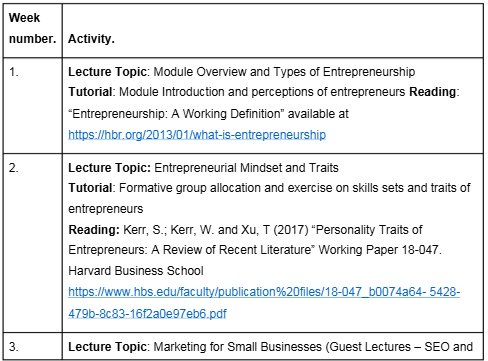
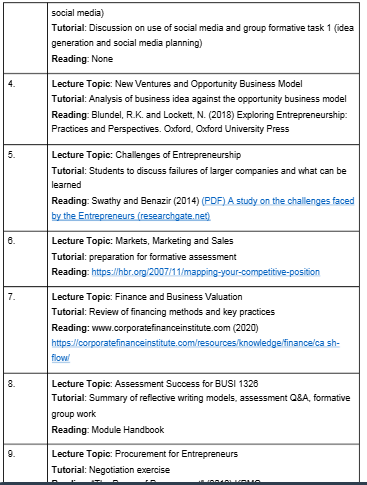
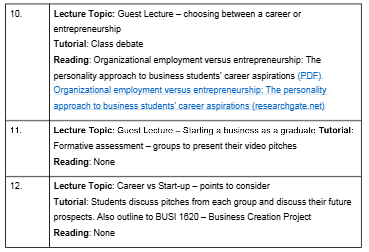
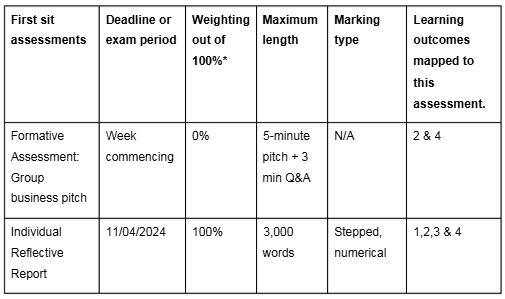
The weighting refers to the proportion of the overall module result that each assessment task accounts for.
Formative Assessment: 5-minute in-class business pitch + 3-minute Q&A (for tutorials week starting 4th December)
Students are to work in groups of 5 members to come up with a business idea and pitch the idea to a group of investors. The design and structure of the pitch is up to the students, but must include the following as a minimum:
Formative assessments are not marked, although feedback will be given. However, the formative assessment forms an essential part of the summative assessment. As such, students are strongly encouraged to engage early and frequently with their group members.
Summative Assessment: Individual Report (100% - 15th December) Students are required to produce a written assignment of 3000 words (excluding references + appendices) which answers the following questions. Please include a reference list for all parts of the work at the end of the assignment (not included in the word limit).
i) Provide a summary of the business idea produced by your group. (500 words)
ii) Summarize the analysis that you carried out for your business idea using the opportunity business model – focus only on 3 or 4 variables. Outline the strengths and weaknesses of your business idea based on your analysis and that from the feedback you received from class and your tutor. (500 words)
iii) Experiencing Entrepreneurship: Write a critically reflective essay using an academically recognised reflective model based on your experience of entrepreneurship from your involvement in entrepreneurial activities during the course of the module. (2000 words)
Students are expected to use at least three activities in the reflective essay, which must include their participation in the Group Business Pitch.
Other examples of activities include attending at least 2 of the Guest Lectures (which count as one activity), listening to podcasts (minimum of three different podcasts), wider reading of material such as biographies of an entrepreneur, attending business start-up exhibitions, participation in events organized by the Generator, attending workshops, experience of running an enterprise during the course of the term, etc.
The reflections should include what you learnt from the above experience, what was new for you, how practice relates to theory, how the course prepared you for starting a business in your working life, what more you would like to know about entrepreneurship, etc.
Please ensure that your report has a strong academic foundation, including theory, empirical evidence, and references. If you use material from case studies or company websites, remember that these need to be properly quoted and referenced just like all other materials.
Important note: Coursework is marked on the understanding that it is the student’s own work on the module and that it has not, in whole or part, been presented elsewhere for assessment. Where material has been used from other sources, this must be properly acknowledged in accordance with the University’s Regulations regarding Academic Misconduct.
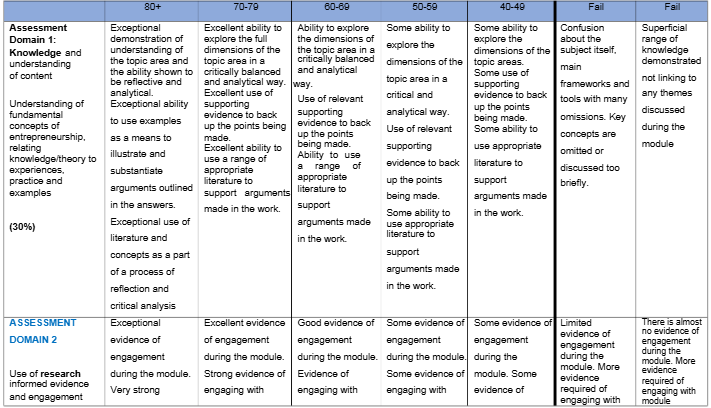
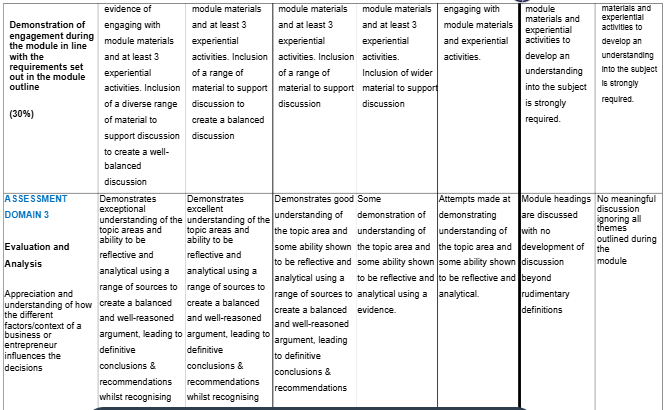
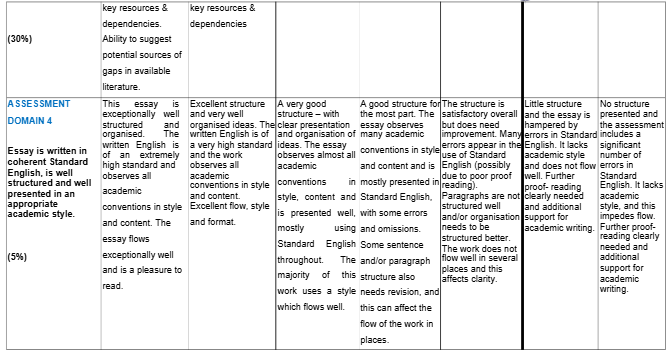
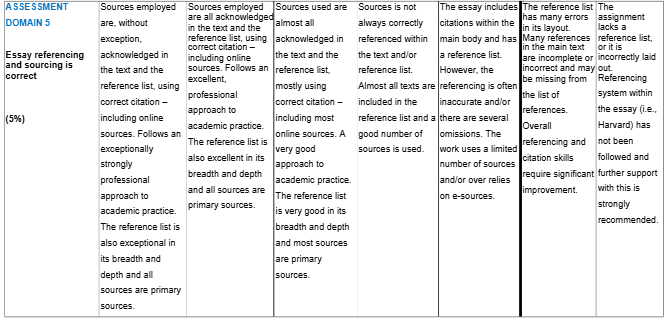
Coursework is marked on the understanding that it is the student’s own work on the module and that it has not, in whole or part, been presented elsewhere for assessment. Where material has been used from other sources, this must be properly acknowledged in accordance with the University’s regulations regarding Assessment Misconduct.
To pass this module, you must achieve an overall mark of 40+ for all assessments.
For coursework, the marks and feedback will normally be provided to students within fifteen working days of the submission deadline. In exceptional circumstances, where there is a delay in providing feedback, you will be informed by the module leader.
If you do not pass a module on the first attempt, you will likely be eligible for a resit opportunity on the failed assessments. The Progression and Award Board (PAB) will decide whether you will be offered an opportunity to resit. Note that marks on resit assessments are capped at 40% unless an extenuation has been applied for and granted.
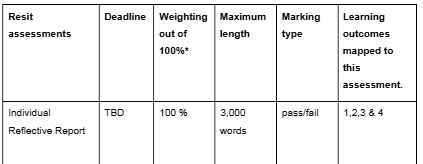
Resit instructions will be provided if any students need to resit the assessment. Depending on the number of students who are required to resit the assessment, a webinar or one to ones will be offered to help students pass the module.
Submit Your BUSI1326 Dissertation Questions & Get Plagiarism-Free Answers
Order Non-Plagiarized DissertationNeed last-minute help with your BUSI1326 Fundamentals of Entrepreneurship Assignment? We are here for entrepreneurship assignment help! From Business Management to technical subjects, we’ve got you covered. Explore our free dissertation samples and experience the quality for yourself. Contact us now to get expert help and score better—without any stress! We also provide University of Greenwich Assignment Samples that have been written by the phd expert writers. Contact us now!
Hire Assignment Helper Today!
Let's Book Your Work with Our Expert and Get High-Quality Content
